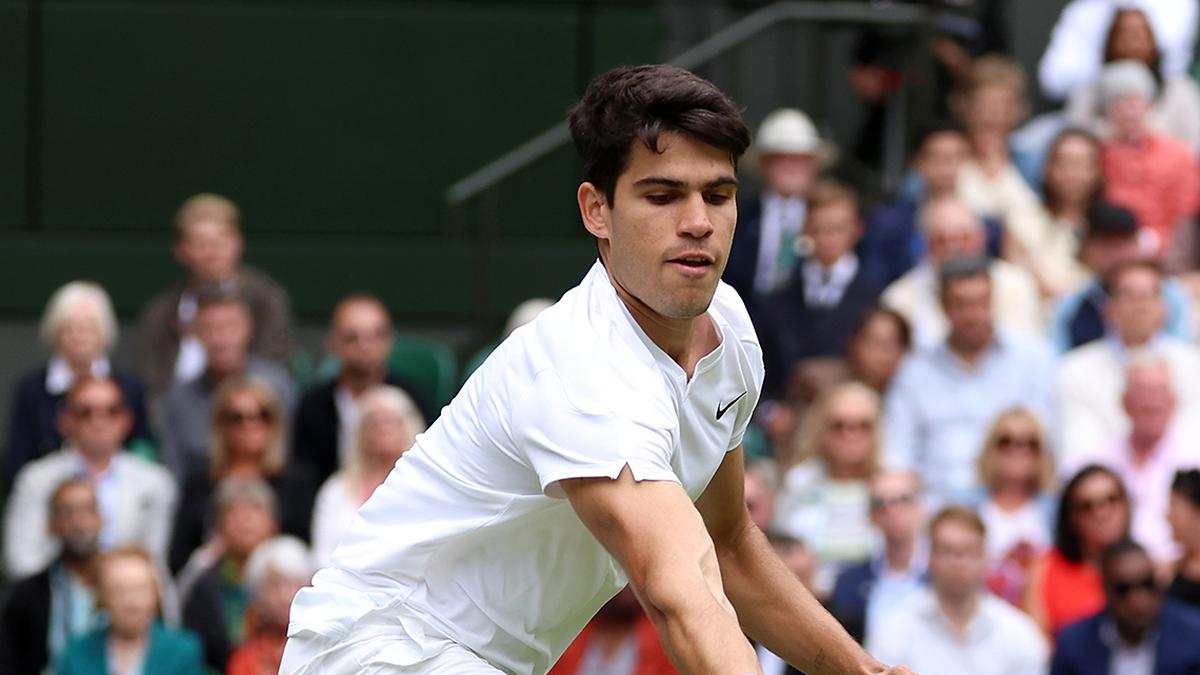Acing the challenge: Once he settled down, Alcaraz was on top of his game.
| Photo Credit: Getty Images
Successful sporting careers depend on three things — talent, hard work and luck. That Carlos Alcaraz was talented was never in doubt. No one who doesn’t work hard wins three Majors in a jiffy. And these last 10 days at Wimbledon have shown that he has some luck on his side too.
On Friday at the Centre Court, the 21-year-old first wobbled like he had all tournament, weathered a first-set storm from Daniil Medvedev before hitting a purple patch to win 6-7(1), 6-3, 6-4, 6-4. In a repeat of last year’s final, the third seed will meet seven-time winner Novak Djokovic, who quelled Italian Lorenzo Musetti’s challenge 6-4, 7-6(2), 6-4.
Novak Djokovic of Serbia reacts after defeating Lorenzo Musetti of Italy in their semifinal match at the Wimbledon tennis championships in London.
| Photo Credit:
AP
“I feel like I am not new anymore,” defending champion Alcaraz said about being in the final. “I know how I’ll feel before it and I will do the things I did last year. I hope it’s going to be a good day for Spanish people.”
That last sentence was in reference to Sunday’s Euro final between Spain and England, and the Brits at the stadium duly rang in the boos. Alcaraz tried to over-explain but the truth was that he had already done enough to please the crowd with his tennis for a good part of the previous three hours.
The opening set was topsy-turvy, with Medvedev and Alcaraz breaking each other twice. The latter’s penchant to play first-strike tennis did not always come off and his love affair with the drop shot had tragic endings. But what kept him in the set was his excellent return game as he blocked or sliced many a monstrous serve from Medvedev back.
The Russian hurt his chances with some ill-advised approaches and rank-bad volleying, often holding the racquet like an axe. He also got away with a mild reprimand, a warning for “unsportsmanlike conduct” for seemingly swearing at the lady chair umpire.
In the tie-break, however, Medvedev’s level lifted. The serve placement was better and his shot-making smarter as he raced to a 6-1 lead. A 120mph rocket second serve sealed the set in his favour.
In the second, Medvedev’s serve swayed. From 76%, his first-serve percentage dropped to 56. At 2-1, Alcaraz made the play, reeling off three winners, two on the forehand and one on the backhand, to break Medvedev. It was one-set all not long after.
“I just tried different things,” Alcaraz said. “Not to play long rallies, try drop shots and go often to the net. It was basically to try and not play his game.”
The third set was its best representation. The service that had deserted him returned and the hyper-extended forehand — almost Federeresque in full flight — found the right corners. Alcaraz being Alcaraz didn’t dilute his fondness for the theatre by continuing to drop shot but this time had a fair amount of success.
The duo traded early breaks in the fourth. Alcaraz, though, was unruffled. He broke Medvedev in the seventh game, and held to 5-3 with a shoelace volley that would have made the greatest grass-courters proud. Medvedev’s shoulders dropped and he soon trudged off the court a deflated man.
